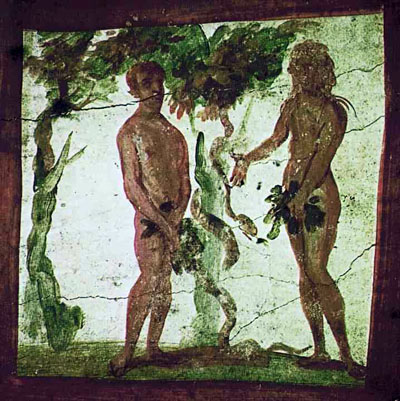 Genesis 3:6-7 are the central two verses of Genesis chapters 2–3. In a previous episode, we looked at Genesis 3:6, and learned a foundational truth about humanity. This episode reveals another foundational truth from Genesis 3:7.
Genesis 3:6-7 are the central two verses of Genesis chapters 2–3. In a previous episode, we looked at Genesis 3:6, and learned a foundational truth about humanity. This episode reveals another foundational truth from Genesis 3:7.
The Text of Genesis 3:7
Then the eyes of both of them were opened, and they knew that they were naked; and they sewed fig leaves together and made themselves coverings.
In this discussion of Genesis 3:7 we look at:
- The fourth foundational truth from Genesis 2–3.
- The ideas that desire leads to rivalry with God and with each other.
- Why Genesis 3:7 is both humorous and sad.
Resources:
- Walton, Lost World of Adam and Eve
- Wenham, Genesis – Amazon or CBD
- Zevit, What Really Happened in the Garden of Eden
- Subscribe and Leave a Review on iTunes
Downloadable Podcast Resources
Those who are part of my online discipleship group may download the MP3 audio file for this podcast and view the podcast transcript below.
You must join a discipleship group or login to download the MP3 and view the transcript.
Thanks for visiting this page ... but this page is for Discipleship Group members.
If you are already part of a Faith, Hope, or Love Discipleship Group,
Login here.
If you are part of the free "Grace" Discipleship group, you will need to
Upgrade your Membership to one of the paid groups.
If you are not part of any group, you may learn about the various groups and their benefits here:
Join Us Today.

Do you like learning about the Bible online?
Do you like learning about Scripture and theology through my podcast? If so, then you will also love my online courses. They all have MP3 audio downloads, PDF transcripts, quizzes, and a comment section for questions and interaction with other students.
If you want to deepen your relationship with God and better understand Scripture, take one (or all) of these courses. They are great for personal study or for a small group Bible study.
You can see the list of available courses here, and if you join the Discipleship group, you can take all the courses at no additional cost. Go here to learn more and join now.


![[#42] Genesis 3:7 – The Greatest Rivalry of All Time](https://redeeminggod.com/wp-content/uploads/2016/06/adam-eve-fresco-150x150.jpg)
![[#41] Genesis 3:6 – Drawn by Desire](https://redeeminggod.com/wp-content/uploads/2016/06/Eve-eating-fruit-Genesis-3-6-150x150.jpg)
 This episode of the One Verse Podcasts look at the third foundational and revolutionary truth from Genesis 2-3. We see it in Genesis 3:6.
This episode of the One Verse Podcasts look at the third foundational and revolutionary truth from Genesis 2-3. We see it in Genesis 3:6.![[#40] Genesis 3:1-5 – Eve and the Serpent](https://redeeminggod.com/wp-content/uploads/2016/06/The_Serpent_eve-150x150.jpg)





 How can a God who says "Love your enemies" (Matthew 5:44) be the same God who instructs His people in the Old Testament to kill their enemies?
How can a God who says "Love your enemies" (Matthew 5:44) be the same God who instructs His people in the Old Testament to kill their enemies?
![[#29] Genesis 2:16-17 – You Shall Surely Die](https://redeeminggod.com/wp-content/uploads/2016/03/tree_of_life-150x150.jpg)
 The Tree of the Knowledge of Good and Evil is a mysterious and troubling element in the Genesis account. Why would God put this tree there in the first place if He didn’t want Adam and Eve to eat from it? We are going to spend two weeks looking at the Tree of the Knowledge of Good Evil.
The Tree of the Knowledge of Good and Evil is a mysterious and troubling element in the Genesis account. Why would God put this tree there in the first place if He didn’t want Adam and Eve to eat from it? We are going to spend two weeks looking at the Tree of the Knowledge of Good Evil.